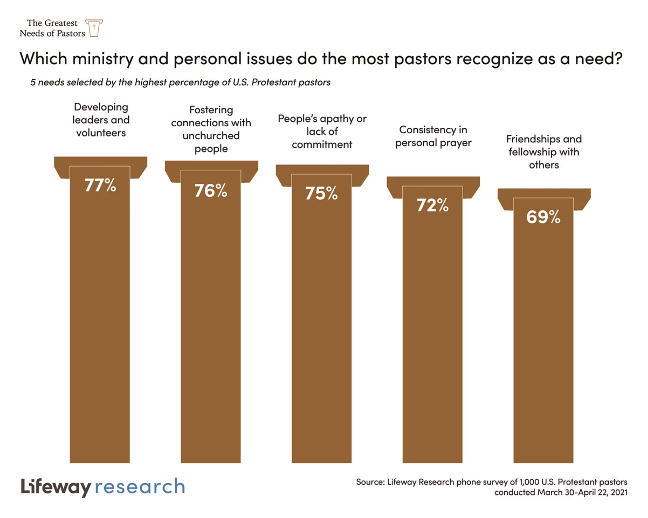

It’s a trite but true saying, one we would follow closely with God’s warning in Genesis 2:18, “It is not good for the man to be alone.” As church leaders, we know all about the need for Christian community. We preach it, write about it, can cite all the verses imploring and commanding Christians to engage in it . . . but few of us can escape the magnetic pull of isolation. No one is an island, but the calling to ministry often seems like a call to living alone.
Even when surrounded by staff, volunteers, and faithful church members, leaders can feel isolated. Our people don’t understand the weight of spiritual leadership. Our work is often minimized to “just getting coffee with people all day.” In addition, we have unique internal struggles that we don’t know how to deal with. We encourage people through their doubts, but don’t know where to turn with our own. We prepare sermons or lessons on confession and repentance while fearing that if we practiced what we preach, we would lose our jobs. And so, we hide, couch the truth behind Christian platitudes, and pretend to have it all together when the seams of our lives are tearing.
For a church leader, isolation can feel like the only way to make it when simply trying to stay afloat has led us to feel misunderstood, unappreciated, and unable to be ourselves. It may not be good, but it seems easier to be alone.
Let me tell you something you already know: the reason you are remaining in isolation—no matter your circumstance—is a demonic lie. Isolation will encourage your secret sins to grow, fertilize the roots of your pride, and hasten inevitable emotional and/or physical burnout. It may feel safe, but isolation will destroy you and your ministry.
Yes, you are in a unique position both professionally and spiritually, but the normal rules of Christian life apply to you in the exact same ways that they do to the people in the pews. More than that, God’s grace and love are equally available to you as they are to the greatest sinner in your Sunday service.
1. You need confession and repentance. Read James 5:13–16. What fears or concerns do you have with confessing and repenting of your sin within your church? What could you gain from turning away from your hidden sin?
2. You do not need to hide your flaws. Read 2 Corinthians 11:28–30 and 12:6–10. What strengths are you tempted to hide behind? What would it look like for you to “boast in your weakness”?
3. You need friends both in and outside of your church. Read Hebrews 3:12–13. In what ways does isolation encourage your sin? Who in and outside of your church could you meet with for regular encouragement and accountability?
You do not have to lead alone. There are countless opportunities for you to connect with other church leaders just like you.
1. Join thousands of pastors, church staff, and group leaders for RightNow Conference.
2. Connect with other pastors who use RightNow Media through the Church Leaders Facebook group. Discover weekly bonus content, best practices, and conversations with others in ministry.
3. Explore the Pastors library—it has great content for pastors and church leaders. Go through a study with other leaders or your staff to grow in Christ together.
The barriers keeping you from being fully known may feel insurmountable, but God is calling you into something far greater than your isolation could ever offer. Ministry can be a burden, but it is never meant to be carried alone. In Christ, you can look at your community and echo the words of David in Psalm 133:1, “How good and pleasant it is when God’s people live together in unity!”
Associate Publisher, RightNow Media
If you’re a decision-maker at your organization, request a free consultation to find out how RightNow Media can equip and inspire your people.
Not a decision-maker?
Tell your pastor about RightNow Media instead.


Let’s be honest—being in control can feel really good. Whether it’s perfectly planning a family vacation or having free creative reign over a project at work, being in control gives us a sense of power that can feel downright exhilarating. When we’re in control of a situation, there’s a level of predictability that puts us at ease and, for a moment, makes us feel like we can predict our future. But control also feeds our belief that we’ve got the skill, foresight, and wisdom to prevent any uncomfortable elements of surprise from entering our lives. And that is a lie.
If we take a step back and look at our desire for control, we’ll see a unhealthy and unrealistic strategy to mask our anxiety—anxiety that we should bring to the feet of Jesus. We might think that being in control is offering us security and safety, but control can strip us from experiencing a beautiful life of faith. It can make us hold onto our idols with a tight-fisted grip and rob us of the ability to mature in Christ.
This isn’t to say that we have no control in this life. After all, God has given us free will and agency to steward our lives, decisions, and the responsibilities he’s given us. Sitting around hoping that God does everything is unrealistic—we still have to make decisions, act in obedience, and use wisdom to walk through this life. But our goal should be to live with God, not by our own power and in our own way. So, how do we use the control God has given us while relying on his sovereignty?
God wants us to rest—and not just by getting enough sleep or relaxing on the beach. When we feel like we have to be in control, we cannot rest. If my present and future depends on me, an afternoon off could be disastrous! What if an email goes unseen? What if my child misses out on an opportunity because of my inaction? Rest is not an option if we have to be gods of our own destinies.
A desire for control creates an inability to rest in the provision of God. He is in control, even when it may not feel like it, and he asks us to trust him with our futures, expectations, and hopes. When we are afraid or worried about tomorrow, we can cast our cares on him because he knows exactly how to handle our needs and our hearts. And, when we trust him, we can live free from worry because we know our good Father is at work, even when we sleep.
If we want to find rest, we have to begin with acknowledging God—not just turning to him when all else fails. However, releasing control is anything but easy. Learning to rest comes with time and allowing the Holy Spirit to help us.
To relinquish control, you will have to surrender your whole life to God. If you’re anything like me, then when you think of “surrender,” you think of someone throwing their hands up during a fight—giving up, vulnerable, with nothing left to give because they’ve run out of options. They’re at the will of their opponent. But when we surrender to God, we’re releasing our problems into more capable hands. In Matthew 11:28–30, Jesus says, “Come to me, all of you who are weary and burdened, and I will give you rest. Take up my yoke and learn from me, because I am lowly and humble in heart, and you will find rest for your souls. For my yoke is easy and my burden is light” (CSB).
It is exhausting to walk through life trying to control everything around us. We are eager to take on burdens that we weren’t meant to carry. Surrendering control is not about giving up, but about God working through our confusion.
Trusting God can be hard when we find ourselves in situations that we weren’t prepared for, nor have the energy to fix right away. Unforeseen circumstances—bills for unexpected expenses, getting fired, or receiving really bad news from the doctor—can leave us in a pit of anxiety. But even when we can’t see the outcome of our circumstances, God can.
Part of learning to trust in God is remembering that not only is he in control, but he’s trustworthy. Proverbs 3:5-6 tells us that we should trust in God and not lean on our own understanding. When we rely on our own futile understanding of life’s circumstances, we’re making decisions based on limited knowledge. When we relinquish control and trust God, we are doing exactly what he has called us to—walking by faith and letting him be God.
We’re not going to know everything ahead of time. We can’t. As believers, we stop looking into crystal balls that promise to tell us the future and trust the God who is with us. We cannot know what will happen in five minutes, but that ignorance forces us to trust God moment by moment and through all the surprises in life.
At the end of the day, we can only control so much—our character, our behavior, and how we choose to respond to our circumstances. Relinquishing control—especially when we’re used to holding tightly to our plans and decisions—can be really difficult. But with the Holy Spirit’s help, we can begin to make choices that lead us into a deeper trust in God, the one who has good plans and hope for our lives.
Consider your life and relationship with control—ask God to help you let go of everything that you’ve been holding onto so that he can lead you to his glorious future.


Sure, we know we’re supposed to grow as Christians and help others do the same, but spiritual growth often feels nebulous. And as church leaders, we often feel like we’ve tried every plan, Bible study, and small group to help people grow, and we wonder if anyone is actually changing.
Discipleship might not be as step-by-step as an instruction manual or as simple as directions on a map. But we do know what a disciple looks like, how disciples act and think, and what disciples create because we know Jesus. He’s our example who clarifies discipleship for us, and as his followers we seek to grow to be more like him.
On November 1–3, pastors and church leaders will gather in Dallas, TX to explore what it means to grow in Christ. As we hear from speakers like David Platt, Jennie Allen, Eric Mason, and more, we'll focus our gaze on Jesus who shows us how to be his disciples.
The gospel is clear: we were once far from God but now we belong to him. And he’s with us always through the Spirit, teaching us to be more like Jesus. As his disciples, we cling to Jesus and his gospel, trusting the Spirit to help us grow (John 13:35; Acts 1:8).
Jesus saves us into a family—the church. We grow the most when we are with other Christians. We teach each other, worship God together, and encourage each other to keep going. As Jesus’s disciples, we help each other grow (1 Cor 12:12–13; Heb 10:24–25).
Jesus commanded his followers to make disciples, and his command applies to us. Making disciples involves sharing the gospel, living in community with other Christians, and pointing others to Jesus. As Jesus’s disciples, we help other people grow (Matt 28:19–20).
As church leaders, we seek to cultivate a church that helps people become more like Jesus, encourages the community to embody his love, and launches believers to share the gospel in word and deed. Our goal is what Paul declared in Colossians 1:28 (NIV): “He is the one we proclaim, admonishing and teaching everyone with all wisdom, so that we may present everyone fully mature in Christ.”


According to the National Institute of Mental Health, about 1 in 5 adults are currently experiencing a mental illness—complicated issues involving mental, physical, chemical, emotional, and spiritual components. It’s safe to assume there are people in your family, at your workplace, and in your church who are currently struggling with mental health. Unfortunately, many stigmas exist around mental health in the church and in the world.
But here’s the good news: God cares about your mental health. In honor of Mental Health Awareness Month, we’re going to break down misconceptions about mental illness and highlight the freedom that comes through knowing Jesus.
Not everyone has a diagnosed mental illness, but everyone has mental health they need to protect. While about 20% of adults experience life with diagnosed mental illnesses, everyone goes through situations and setbacks that influence their mental wellbeing. A stressful work environment, the death of a loved one, a change in your relationships, or a traumatic experience are just a few examples of common mental health triggers.
Even if you’re in the 80% of people living without a diagnosed mental illness, you can still be part of the conversation. While not everyone talks about it, mental health is a relevant issue for all people.
Because of the recent increase in mass media conversations about mental health, it may seem like mental illness is a new issue. But the modern conversation is only catching up to what’s always been true: mental illness is a real struggle for many people.
Take King David, for example—most of his psalms are emotional cries to God in deep pain or true joy. If you’ve ever felt depressed, you’re not alone. Listen to what David writes in Psalm 6:
“I am weary from my groaning;
with my tears I dampen my bed
and drench my couch every night.
My eyes are swollen from grief;
they grow old because of all my enemies.”
In addition to David, Elijah and Job also faced mental health struggles. Elijah’s mental health suffered during his conflict with Jezebel to the point of Elijah wanting to die (1 Kings 19:3–4). Job felt depressed and fearful in response to his pain and loss (Job 3:24–26). If you’ve ever been emotional because of a broken relationship or situation in your life, you’re in good company. The Bible is a story of imperfect, mentally unhealthy people pursuing a perfect God who can restore hope in even the darkest moments.
The Bible explains Jesus as being without sin, but not without temptation, trials, or emotions. Jesus was fully God and fully human. He can relate to you.
Hebrews 4:15–16 puts it this way:
"For we do not have a high priest who is unable to sympathize with our weaknesses, but one who has been tempted in every way as we are, yet without sin. Therefore, let us approach the throne of grace with boldness, so that we may receive mercy and find grace to help us in time of need.”
The Bible shares countless stories of Jesus experiencing a vast spectrum of emotions. In his time on earth, Jesus was “tempted in every way as we are” so that he would be able to “sympathize with our weaknesses.” There is no feeling, situation, or mental illness that disqualifies you from Jesus’s understanding presence.
If you are currently struggling with mental illness, you are not alone. You are loved, seen, and cared for by God. Please reach out to a trusted doctor or spiritual leader for insight and advice. There is hope and healing for you.
If you are not struggling with mental illness, there’s probably someone in your life who is. Your kindness and compassion toward those who are struggling helps more than you realize. Your grace and empathy could be the answer to someone else’s prayer.
Wherever you’re at on your mental health journey, God is right there beside you. The fight for mental health is difficult, but you are never fighting alone.


Friendship is one of the most important and formative features of the human experience, and one of its sweetest pleasures. Because of its significance, literature is filled with moving examples of friendship, from Sam and Frodo in The Lord of the Rings to Harry, Ron, and Hermione in the Harry Potter series. These stories, and others like them, invite us to make friendship a priority.
The Bible also speaks of friendship’s important, formative effect on our lives. From the example of David and Jonathan (1 Samuel 18:1–5) to the language Paul uses in his epistles to Timothy (1 and 2 Timothy), the witness of Scripture testifies that friendship is a blessed good. Solomon himself reveres friendship, using words like “sweetness” (Proverbs 27:9) to describe its joys and “love” (Proverbs 17:17) to convey its depth and devotion.
Friendship is not just a blessed good but a generous gift from God.
Since we’ve been created in the image of the triune God (Genesis 1:27), we are made for community—for friendship. In some ways, it comes natural to us. We gravitate to others, finding common bonds, common interests, and common loves. And yet, because we and the world have been fractured by sin, friendship is hard. We sin against our friends, they sin against us, and relationships suffer and sometimes break.
In Genesis 2 and 3, the Bible implies that life for Adam and Eve was to be marked by fellowship (or friendship) with God. It was apparently normal for them to speak with God and to walk with him. But then, Genesis 3:6–7 happened—the fall—and their fellowship was disrupted. With one fateful bite of fruit, Adam and Eve effectively “unfriended” God. And to this day, we live in the shadow of the fall. Like Adam and Eve, our friendship with God has been disrupted.
How would you respond to being so grievously betrayed? Would you overlook the offense? Would you abandon your friend entirely? How do you think God should react?
The New Testament tells us how God responded to our betrayal: “When the fullness of time had come, God sent forth his Son” (Galatians 4:4,), the “friend of sinners” (Luke 7:34, emphasis added), and made him “who knew no sin to be sin, so that in him we might become the righteousness of God” (2 Corinthians 5:21) so we might have a right relationship with him once again. Do you hear that? In response to our sin and our ruptured relationship, the Son comes and befriends those who betrayed him.
What’s most shocking about Jesus’s friendship is that he calls us friends. Though we have betrayed him, he “chose” us (John 15:16). By his grace, he has come near to us and, knowing our disloyalty and all our fears, sins, struggles, and anxieties, he has said to us, “my friend.”
Knowing ourselves, we may wonder, “Is Jesus truly—I mean, really—my friend? Will he stick by me, even if I betray him again?”
We can know Jesus is our friend with certainty because of what he says to us in the Gospel of John: “No one has greater love than this: to lay down his life for his friends” (John 15:13, CSB). Jesus is the greatest friend because he laid down his life for us (John 19).
We know from Proverbs that “a friend loves at all times” (Proverbs 17:17). Since Jesus is our friend, we can be certain that he loves us entirely, perfectly, forever—at all times. And we know that, despite what we have done or have yet to do, he “is a friend who sticks closer than a brother” (Proverbs 18:24).
So, we ask: “Who shall separate us from the love of Christ” (Romans 8:35), this friend of sinners, this great friend of mine? No one. Oh, what a friend we have in Jesus.
Knowing that Jesus is a devoted friend should encourage us. It should also inform the way we view and exercise friendship ourselves. Each of us needs good friends in our lives; but if we’re not careful, we might begin to think like the lawyer in Luke 10:25–37 who tested Jesus: “And who is my [friend],” we might ask (emphasis added).
While that question is not an inappropriate one, what if Jesus first wants us who have experienced his friendship to be the same kind of friend to others? What if, upending our sensibilities as he did with the parable of the good Samaritan, he is calling us to go to our neighbors who are isolated and lonely, and befriend them? Who among us will prove to be a friend to the friendless?
Jesus has come and called us friends. Today, he tells us: “Go and do likewise” (Luke 10:37).


The following is an excerpt from www.Exponential.org, originally written by Dave Ferguson on January 8, 2023. For more wisdom from Dave, check out Lost Cause, a five-session RightNow Media video series on evangelism.
We need to create and use language that reinforces our values. We must be intentional about creating and consistently using vocabulary that mobilizes Christians to reach lost people. The clarity, consistency, and intentionality of our narratives, language, behaviors, and practices are an overflow of the clarity and conviction of our values.
Consistency is one of the keys to effective storytelling. We need to use the same language, in the same ways, over a long period of time.
One of the things we learn as church leaders over time is that just when we get sick and tired of repeating phrases is when the congregation is just beginning to get it. We like to be onto the next new terminology, and often it works against us.
To create narratives that make it clear evangelism is important to us, we need to be willing to embrace repetition.
The reason we need to pay so much attention to our language is that we are responsible for telling the most important story in human history: the gospel. This is the story of a redeeming God who came to live among us in the human form of Jesus before dying for our sins, coming back from the dead, and leaving his Holy Spirit with us to empower us to share this story widely and well. We are all responsible for telling this story in a way that makes clear the fact that all human stories lead back to Jesus’ story.
We are all lost and in need of our risen savior.
We see Jesus articulate this in one simple statement in Luke 19:10: “For the son of man came to seek and save the lost.” That was Jesus’ mission. And that should be our mission, too. And, therefore it certainly should be the mission of his church. If that was his mission, we should ask ourselves: how did Jesus live out his mission in the story of his life?
From the beginning, Jesus’ story expands beyond the religious institutions of his day. These spaces were often closed to outsiders and the lost, but through his actions and words, he expressed his values (and that of his father) to welcome people into a new story.
When you follow Jesus’ example and intentionally connect with people far from God you’ll begin to get questions about why you believe stories from the Bible, and about how your life story has changed as a result of your relationship with Jesus. Be prepared for these moments because they offer golden opportunities to open doors. They allow you to build bridges between the stories that others tell you and the story of Jesus.
We also see from Jesus’ examples that we have an easier time sharing our stories with people during meaningful moments that don’t necessarily take place in our church buildings. For many of us, this will require a shift in our ecclesiology, the way we come together and experience church. If you have a mindset that evangelism happens only in a building once a week (the common model for most of our Western cultures) you’ll miss opportunities to build relationships that create space for storytelling and story-sharing. It’s hard to build relationships while sitting in the pews listening to sermons, attending Sunday school, or taking communion.
As we seek opportunities to tell our stories, it can be helpful to use a simple storytelling framework that helps us connect to others around us. I use a simple three-part format to share my story and it’s been so effective I wrote about it in my book BLESS: 5 Everyday Ways to Love Your Neighbor and Change the World. You wouldn’t believe how many stories have come out of this method.
What was your life like before you met Jesus? Or if you grew up in the church knowing all about Jesus, what was your life like before you got serious about following him? Your story begins with who you were.
How did you become a Christ-follower? Did you go through a particularly tough time in your life that led you back to God? Did a friend invite you to a church service? Did a family member introduce you to Jesus? Did a life experience inspire you to get serious about following Jesus?
What difference has following Jesus made in your life? How has knowing him impacted both the good and hard times? Yes, when telling your story, include both the good and the hard. People will be more impacted when you’re honest about the challenges you continue to face even when you’re following Jesus. And don’t give the Sunday school answer. Talk about how your life is different and how God is growing you in certain areas, but make sure you’re sincere about how it’s a process and how often you still make mistakes.
To learn more about developing narratives of evangelism in your church or community, watch Lost Cause, a RightNow Media original series made in partnership with Dave Ferguson and Exponential.


He does. What we view on our screens directly affects how we think, feel, and behave. And God has opinions about the character of his people.
Parents know technology’s power intuitively, as we raise children in a digital age dominated by screens. The truth of Romans 12:2 applies to our online life too:
“Do not conform to the pattern of this world, but be transformed by the renewing of your mind. Then you will be able to test and approve what God’s will is—his good, pleasing and perfect will.”
How can parents help children see the role of technology in their pursuit of God’s will?
We must remember that digital content providers generally don’t care about our spiritual formation. They just want our undivided attention. Video games fix our concentration through built-in rewards that keep us coming back. Social media algorithms train us to seek likes and follows. Streaming platforms produce volumes of content aimed at enticing repeat viewers. Adults and children alike can be wooed into mindless—and countless—hours online.
Kids do not bear full blame for screen overuse—we parents are often tempted to choose computer games or movies to occupy our kids so that we can accomplish our own tasks. Laundry and meal prep loom daily. Perhaps we homeschool older children or work from home. Screens offer an easy distraction for kids that allow us to accomplish a little more than we otherwise could.
The over-use of screens expanded exponentially in 2020 as parents struggled to manage lockdowns and quarantines during the Covid-19 pandemic. Many schools turned to online learning, forcing students to stare at screens for hours on end. Working parents fared similarly, with many transitioning from office to home via laptops, Zoom, and constant digital access to work.
“There are rooms full of men and women with PhDs in addictive computing, and they have a plan for your life—for you to look at that golden rectangle all day long,” warned Dr. John Dyer, a professor at Dallas Theological Seminary, at a panel on social media.
“So if you don’t have a plan, you are not going to win. If you don’t think through how you are going to use it, then you’re going to fail.”
So let’s start planning.
Screens can be amazing, powerful tools for education, social connection, spiritual growth, and creativity. But children and teens have one plan for their devices: to play on them as much as possible. We parents must guard our kids’ minds while also training them how to do so for themselves.
Balance your child’s online time with reading, physical activity, chores, and play time. Make technology merely one aspect of life rather than the dominant pastime. Turn devices off at family time and bedtime and be prepared to remove them completely if your kids’ behavior warrants it.
The internet is an open door that allows anyone to enter your home. Filters, blockers, and monitoring software remain effective tools that help parents prevent children from finding inappropriate material. Teach your kids what to do when they accidentally access inappropriate content. Help them remember 2 Corinthians 10:5, “We take captive every thought to make it obedient to Christ.”
As kids transition from TV to tablets, laptops to smart phones, let’s invite them to use their devices to bless others. What games are our kids playing? How are our teens engaging in social media? And do they consider how they reflect God’s character in their online lives?
When used wisely, technology is a gift that blesses our society. In Redeem the Screen, Kyle Idleman discusses how our screens can work to conform us to our culture. But God wants us to conform to his image. What could it be like to leverage our screens for God’s glory?
We must teach our children that people matter most. With this perspective, our kids will develop the ability to own their technology instead of it owning them. Their social media feeds will trend positive rather than negative, building others up instead of tearing them down. As you peek into their online habits, you’ll find practices to encourage and some to correct, always using Scripture as your guide.
And as we parents model admirable online habits, we can cultivate a godly perspective on why and how to use screens. If we allow our smartphones to dominate our lives, so will our kids. If we choose uplifting content to watch, speak life on our social media platforms, and practice healthy habits with our screens, they will have no excuse.
Screens can rule us if we let them. But tools are meant to be mastered for our benefit, not become our masters to our detriment. Through wisdom and discipline, parents can help kids purpose their online presence and use for their good and for the gospel.


In the early days, it can be thrilling to plant a church. There is so much potential, so much hope. We want to do everything we can to make our churches succeed. However, we often equate growth with success, and while we know that God is the one who builds the church, we may still feel an urgent need to manufacture momentum.
We want our churches to “get big” as quickly as possible, and for good reasons. Size creates financial stability, multiplies our impact, and lets pastors delegate responsibilities to gifted leaders. So why wouldn’t we want rapid growth and good momentum? Momentum creates excitement. Momentum turns congregations into movements. Momentum is what turns small house church planters into recognizable pastors with influence and acclaim.
But momentum can also be a poisoned chalice.
While we rush to brainstorm growth strategies, we don’t often stop to consider the costs or pitfalls of growth. Church planting is demanding work, and we can assume that once we hit one hundred, five hundred, or a thousand members then things will calm down. Only too late do we realize that the work never slows down without us intentionally hitting the brakes.
We don’t have to look far to find friends or famous pastors who have burnt out and are no longer in ministry. We can all name fellow leaders who became enamored with church size or rooted their identity in their sermon views. Those stories don’t end well.
There are good and righteous reasons for a church to grow, but when growth is our goal, God can cease to be our aim. Is growth worth the potential cost? Would you drink that cup even if it sapped the vibrancy out of your relationship with God, your family, or your church community?
For many of us, the answer would be “no.” But how can we avoid the allure and dangers of momentum?
In Hebrews 11:32–38, we find an odd pairing of saints. The first group “conquered kingdoms, administered justice, obtained promises, shut the mouths of lions, quenched the raging of fire, escaped the edge of the sword, gained strength in weakness, became mighty in battle, and put foreign armies to flight” (CSB). The second group of saints was tortured, destitute, and misunderstood. Which group would you say was successful? According to the author of Hebrews, the answer is both. Saints are not judged by their circumstances or fates, but by their faithfulness.
Your value as a church planter is not found in your church’s size, but in being loved by God.
Your identity is not found in being a best-selling author, popular podcaster, or leadership guru, but in who God says you are. Your purpose is not to build God’s church, but to faithfully make disciples.
When faithfulness is our goal, the pressures of rapid growth look like nothing more than glittering distractions. Sermons are an opportunity to faithfully proclaim Jesus, not a platform for our personality. Leadership becomes an opportunity to serve rather than to domineer and lord over our staff and volunteers. The people in our church become our focus rather than the empty seats.
Your church’s size plays no role in your ability to be faithful.
Therefore, your church size cannot be an indicator of your success. If God does not judge your church by its appearance, why would we?
Being obedient to God will lead each of us to different outcomes. Some churches may launch with hundreds of people, while others never grow beyond a small group meeting in a living room. Both can be faithful, successful churches. God is the one who changes hearts and saves lives. He builds his church. We are servants in his house—there is no reason for us to manufacture what only he can do.


Many aspiring politicians hope to become president of the United States one day. But the vast majority of them, despite countless county fair hot dogs, late nights, and fundraising emails, will never sit in the Oval Office. Their desires and dreams are based on subjective possibilities beyond their control.
Across the pond, William, son of England’s Prince Charles, hopes to become king of the United Kingdom one day. As the grandson of the queen, the son of the heir apparent, and second in line to the monarchy, he is counting on over a thousand years of law and tradition to guarantee his eventual accession to the throne. It’s safe to say he confidently expects to be king one day.
Whose hope, the politician’s or the prince’s, more closely resembles yours? Like our political candidates, we often use hope to express a desire or wish for a possible outcome. Hope can seem vague and subjective, difficult to pinpoint. It can be a feeling, an impression, a wish—often felt with deep fervency. I really hope my team wins tonight. I sure hope Mom cooks my favorite meal.
Feelings of hope brighten our countenances. But in the end, we’re still waiting for something we can’t guarantee will happen. William’s hope, however, is a confident expectation that his head will one day wear the crown. The law and his family tree are a sure foundation for his hope.
When the writers of Scripture speak of hope in God, they use words of waiting, confidence, and trust. When God is the object of our hope, we wait in confident expectation. Why?
God has proven his reliability, trustworthiness, and power; therefore, our hope in him is well-deserved and sure.
God’s provision and redemptive acts are fulfilled in the birth, life, death, and resurrection of Jesus Christ. The power of biblical hope lies in its object—God’s faithful character and matchless power—rather than the fervency of our feelings.
Jeremiah, praying to God, “Hope of Israel, its Savior in times of distress” (Jeremiah 14:8) and “LORD, the hope of Israel” (17:13).
Paul names Jesus: “Paul, an apostle of Christ Jesus by the command of God our Savior and of Christ Jesus our hope . . .” (1 Timothy 1:1).
Jesus’s victorious return: “. . . while we wait for the blessed hope, the appearing of the glory of our great God and Savior, Jesus Christ” (Titus 2:13).
The church is sometimes called “the hope of the world,” but any hope that we offer to the world comes from our savior. Jesus is the hope of the world, and he calls us to share his message of love, grace, and salvation. Because he is all-powerful and ever-faithful, we can look to the future not with dread but with joyful anticipation. We can endure disasters and conflicts and every disappointment with a sense of purpose.
God’s word is true, and his gospel offers hope for each of us individually, for the church as a body, and for the world which hasn’t yet recognized its savior.
“Now may the God of hope fill you with all joy and peace as you believe so that you may overflow with hope by the power of the Holy Spirit” (Romans 15:13).
“For this reason we labor and strive, because we have put our hope in the living God, who is the Savior of all people, and especially of those who believe” (1 Timothy 4:10).
“But thanks be to God, who always leads us in Christ’s triumphal procession and through us spreads the aroma of the knowledge of him in every place. For to God we are the fragrance of Christ among those who are being saved and among those who are perishing” (2 Corinthians 2:14–15).
As the body of Christ set apart to bear his name, the church reflects the glorious likeness of our savior. He calls us to shine like stars in the world, proclaiming him in word and deed. The risen Jesus is our hope both now and eternally.
More than even the law and a thousand years of tradition, more than aimless waiting or wishful thinking, we have reason to hope.


I’d spent my whole life in stage-of-life groups with people like me—guys with similar interests and struggles. Those groups made connecting with other Christians easy, but this new group was a challenge. I felt I had little in common with the retired empty-nesters and college students in my living room. I struggled to ignore the chaos of the toddlers playing on the floor. And I had no clue how to counsel married couples.
The people in my small group watched movies I’d never heard of, inhabited various corners of social media, held opposing political views, and even had different ideas on how to live the Christian life. How was I going to lead this group, much less help them build friendships with each other across their diversity?
I was facing the big challenge of multigenerational groups: connection. Because we gravitate to people like us, diversity can feel uncomfortable. But if we stick with the tension of getting outside of our bubble, we can find the richness of the body of Christ in all of our unique gifts, experiences, and wisdom.
Every group is different, and leaders can try many strategies to help their group form good, lasting relationships. But, as the leader, you need a strategy to help people overcome feeling disconnected from other group members.
Leading a healthy small group is like gardening: we can prepare the soil and water the seeds but only God can make the seeds sprout and grow. You can’t force friendships, but you can create a place for them to grow.
Think about the times you have felt most welcome in someone else’s home—what did they do that made you feel comfortable and appreciated? You don’t have to throw a dinner party; sometimes people just need to be asked about their day. Find the person standing on their own and strike up a conversation with him or her. Or if there is a young mother in your group, think about setting aside a space for her infant to sleep or nurse. A little consideration can make everyone who visits your group to feel valued.
The people in your group have a wealth of experiences and wisdom—far beyond what you as a leader have on your own. Instead of worrying about what you need to teach, think about the questions you can ask the people in your group. What do you want to know about them? What insights do they have that would bless the rest of your group? What have they learned about God and his faithfulness
If you have a hard time thinking of good questions, that’s okay! Most RightNow Media Original series come with free study guides full of great questions so that you can worry less about preparing lessons and focus more on the people in your group.
Everyone is busy, and it can feel like a struggle to make it to small group every week. But if you want your members to share their lives with each other, you will need to spend time together outside of your small group meeting. Don’t make it too complicated—you could get coffee with one person in your group each week or coordinate group lunch after church on Sunday. The more casual interactions you have with people in your group, the faster you will build meaningful relationships with them.
Every church has different goals for their small groups, but we all share the same mission: to make disciples and build God’s kingdom on earth. And nothing brings a group together like working as a team. Talk to your group about the causes and groups of people God has called them to serve. What need can your group meet? If your group has little kids, consider partnering with a local non-profit that can be flexible in the way you serve and are open to family friendly projects. Or find a place to serve as a group in your local church—if you get stuck, ask your pastor or other group leaders for ideas.
No one wants the relationships in their group to remain shallow. Getting together week after week to talk about news, sports, or the weather is, quite frankly, boring. We want our groups to be hubs of deep community marked by friendships, support, guidance, prayer, and evangelism. But meaningful friendships don’t happen overnight. It can take months (or longer) for a group to feel like a community. Don’t get discouraged when relationships don’t progress as quickly as you would like. In time, God will weave people together in ways you had not imagined. Don’t give up.
The first few months of your small group will be the most challenging as people push through awkwardness and build friendships with one another. In my group, some of the most unexpected people—people who did not immediately click with one another—ended up best friends and were in each other’s weddings. They’ve built families alongside one another, leaning on each other’s wisdom and support.


If you’re feeling overwhelmed and underequipped as a church leader, you’re not alone. With the influence of social media, changing cultural dynamics, and the impact of the COVID-19 pandemic, today’s pastors face unique challenges. According to recent studies, today’s pastors are struggling with everything from time management to trusting God. Lifeway Research spoke with more than 1,000 pastors about their greatest needs; five were most commonly mentioned:

At RightNow Media, our core value is “The mission of the church matters.” We are here to pray for, equip, and encourage church leaders in their ministry because healthy leaders are crucial to building healthy churches.
As a busy pastor, it can be hard to find time to equip your leaders and volunteers. While digital training can’t replace in-person experiences, it is an effective tool to develop your leaders outside of face-to-face trainings. RightNow Media has a library full of Interactive Training Content you can assign to your leaders to complete when it's convenient for them. Or, click here to learn how you can create your own Interactive Content.
The following blog post will help you learn about some of the fears and doubts your leaders and volunteers may be experiencing. You can share this article with your team to encourage them!
Jesus clearly calls us to “go and make disciples of all nations” (Matthew 28:19–20). But outreach ministry can take a backseat when we feel too busy with what’s going on inside the walls of our church.
Even if you don’t have a designated external outreach ministry, you can still foster connections with unchurched people. Read this blog post for practical ways you can begin to bridge the gap between your congregation and the unchurched.
We all want our churches to thrive, but many of our congregations struggle with attendance, recruiting volunteers, and keeping members engaged. There may be moments when you feel like one of the only people committed to the mission of your church. But no matter how you feel, God’s promises are true and he promises to never leave you or abandon you (Deuteronomy 31:6).
Read this blog post for an encouraging word on staying committed to the church even when you sense apathy in your congregation.
With the many responsibilities of shepherding others, pastors can unintentionally put their personal relationship with God on the backburner. In our desire to be self-sufficient, we often forget that we have a Father who hears our prayers and loves when we talk to him.
Reignite your passion for prayer with this practical blog post all about the gift of talking with your heavenly Father.
While church leaders often preach the need for Christian community, the perceived safety and comfort of isolation can tempt tired pastors. While it can be difficult to find people who understand the unique weight of spiritual leadership, community is worth pursuing for pastors in every stage of their ministry.
Set aside a few moments for self-reflection and to answer the questions in this blog post written specifically to pastors. Then, consider the opportunities in your life to connect with other church leaders.
It’s a challenging time to be a pastor, but current circumstances don’t nullify God’s promises. Listen to what God says through the prophet Isaiah:
Do not fear, for I have redeemed you; I have called you by your name; you are mine. When you pass through the waters, I will be with you, and the rivers will not overwhelm you. When you walk through the fire, you will not be scorched, and the flame will not burn you. (Isaiah 43:1–2)
No matter what difficulties you face as a church leader, God’s love for you is unwavering. His plans for you are good. His divine power has given you everything you need for a godly life (2 Peter 1:3).



